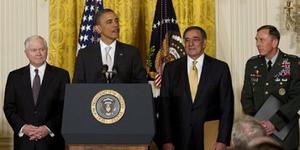New way of warNew DOD and CIA appointments signal shift in military thinking
In appointing General David Petraeus as the next director of the CIA and Leon Panetta as Secretary of Defense Robert Gates’s replacement, President Obama is helping to solidify the increasingly intertwined roles of the two departments; in recent years, the CIA has become more of a tactical agency frequently engaging in kinetic operations with its predator drone program above the skies of Pakistan, while the Defense Department has stepped up its own intelligence operations; observers note that the increasing muddying of the two organizations is part of a shift in thinking on combat operations and intelligence needs in the post 9/11 world; critics of this trend say that this may reduce each agency’s operational effectiveness

Gen. Petraeus takes over the CIA, Leon Panetta to Defense // Source: nationaljournal.com
In appointing General David Petraeus as the next director of the CIA and Leon Panetta as Secretary of Defense Robert Gates’s replacement, President Obama is helping to solidify the increasingly intertwined roles of the two departments.
In recent years, the CIA has become more of a tactical agency frequently engaging in kinetic operations with its predator drone program above the skies of Pakistan, while the Defense Department has stepped up its own intelligence operations.
According to the New York Times, under Leon Panetta’s tenure as the head of the CIA, the agency has established a strong presence in Afghanistan operating out of remote forward operating bases, secret stations, and deploying covert agents across the country.
Meanwhile, as the head of U.S. Central Command, General Petraeus has pushed the military further into intelligence, often sending Special Operations forces and private security contractors to conduct intelligence missions.
In September 2009, General Petraeus signed a classified order that authorized the use of American troops to gather intelligence in Saudi Arabia, Jordan, Iran, and other countries that were not active theaters for U.S. combat forces.
The secret order was designed to build up military intelligence networks throughout the Middle East and Central Asia to penetrate, disrupt, defeat and destroy” militant groups and “prepare the environment” for future American military attacks.
While this move takes the military into the CIA’s realm of operation, Petraeus worked closely with the CIA to develop the order.
Critics of this trend say that the lines between American intelligence and defense agencies have become blurred limiting transparency and reducing operational effectiveness.
Members of the CIA have objected to the increasing devotion of their agency’s resources to the bombing campaign in Pakistan believing that it is not part of the CIA’s core mission and that it has become an extension of the Defense Department.
Henry A. Crumpton, a long-time CIA officer and the State Department’s former top counterterrorism official, warned of the dangers of the “militarization of intelligence” with more former military officers taking leadership roles in the CIA.
While Crumpton believes that General Petraeus is “one of the most sophisticated consumers of intelligence,” he cautioned that military officers bring a different perspective on intelligence operations than their civilian counterparts.
“If the intelligence community is populated by military officers, they understandably are going to reflect their experiences,” Crumpton said.
On the other side, officials at the Defense Department worry that with more troops engaging in intelligence gathering they are more at risk of being thrown in jail and denied protections under the Geneva Convention when captured in the field.
President Obama’s decision is the continuation of a broader trend as Secretary Gates, who was first appointed by President George W. Bush in 2006, was the director of the CIA from 1991 to 1993.
Before that, Secretary of Defense Donald Rumsfeld worked to actively bolster the Pentagon’s intelligence gathering capabilities so that it would have to rely less on the CIA.
Observers note that the increasing muddying of the two organizations is part of a shift in thinking on combat operations and intelligence needs in the post 9/11 world.
Senator Jack Reed (D –Rhode Island), a former Army officer and a member of the Senate Armed Services Committee, explains that in recent years “in the field, there is a blurring of the mission.”
“Military operations can buy time to build up local security forces, but intelligence is the key to operations and for anticipating your adversary,” he said.
